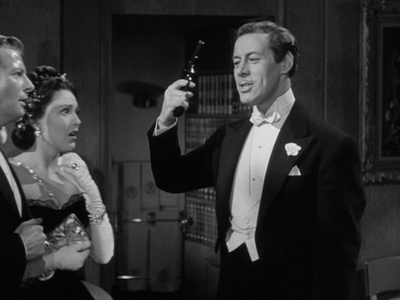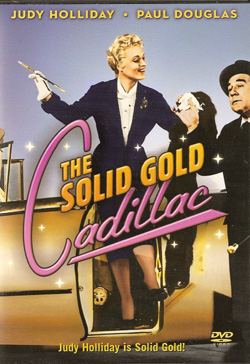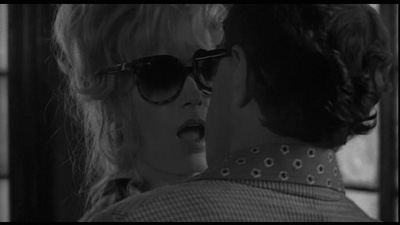March 28, 2006
The Little Foxes at CultureSpace
As readers of the Daily Blague know, I've discovered a very interesting new Web log, CultureSpace. It's written by MS Smith, and I'm linking to his site from here because he has written a fine entry about William Wyler's The Little Foxes (Goldwyn, 1941). I like to write about older movies every now and then, and I'd probably get to The Little Foxes eventually. It's a stunning picture, although Bette Davis often seems to be anticipating her role in The Virgin Queen (1955). Herbert Marshall, Teresa Wright, and Patricia Collinge are simply lovely.
But now I don't have to. Read MS Smith.
Posted by pourover at 03:32 PM | Comments (0) | TrackBack
July 25, 2005
Unfaithfully Yours

Alfred Hitchcock once remarked that he made his films to be watched a second time. Only when the distraction of suspense has been cleared away can the viewer appreciate the great artistry with which Hitchcock filled the screen. The same is true of Unfaithfully Yours, Preston Sturges's rather dark 1948 comedy for 20th Century Fox. Only when you know how everything works out can you appreciate the immense high silliness of the the three central scenes, in which a celebrated conductor indulges, while conducting an orchestra, in three different fantasies of disposing of his wife, and only when you see the finale the second time can you savor its glorious ironies. Another thing that improves with repetition is Rex Harrison's stupendous performance as the conductor, Sir Alfred de Carter.
To suggest the level of this movie's sophistication, I shall gloss Sir Alfred's name. If you are of a certain age, you'll remember hearing of Carter's Little Liver Pills. They were laxatives manufactured in the United States. In England, there were Beecham's Liver Pills, also laxatives. A scion of the Beecham family exhausted the family fortune in the production of Handel operas and Delius concerts. That would be the great Sir Thomas Beecham. When Sir Alfred de Carter says, in passing, that his family's product has "kept England on time since Waterloo," without naming the product itself, we are hearing a lame attempt to ward off any litigation from eccentric (and depleted) maestros. I've never heard that Sir Thomas was even aware of Unfaithfully Yours, but I imagine that he'd have been rather pleased to find himself portrayed by the slim, dashing, and hyperarticulate Rex Harrison.
Sir Alfred is married to the beautiful Daphne (the beautiful Linda Darnell), from whom he has been reluctantly parted by musical engagements abroad.
Continue reading about Unfaithfully Yours at Portico.
Posted by pourover at 12:00 AM | Comments (0) | TrackBack
July 19, 2005
The Palm Beach Story
Princess: Oh I love you like this, with lightning flashing out of your eyes.
For quite some time, my two favorite funny movies have been The Awful Truth (1937) and The Palm Beach Story (1942). I have never been able to put one ahead of the other in a list, and the movie in third place - well, I don't know what the movie in third place is. How about a tie between Bringing Up Baby (1938) and its remake, What's Up, Doc? (1972)? My two favorites have a few things in common - they've both about rich people, for one thing - but they're really very different. The Awful Truth takes place entirely in well-appointed rooms, an imposing court, and a fantastical night club. The Palm Beach Story takes place very largely outdoors and on the move - on a train, on a plane, on a yacht, and even in the driveway. The soundtrack, which is full of tongue-in-cheek quotations from the classics, gives the movie a musical feeling, and Rudy Vallee actually sings. (And one of the things that he sings, briefly, is that Paramount inevitability, "Isn't It Romantic?") The Awful Truth limits itself to two musical items, "Home on the Range" and "Gone With The Wind," a novelty number not directly inspired by Miss Mitchell's opus. And where The Awful Truth portrays rich people as they're conventionally imagined by Hollywood, The Palm Beach Story is insider information, written from the standpoint of someone very familiar with the high life - as writer, director, and producer Preston Sturges was - and altogether unconcerned with whether the mass audience "gets it."
Finally, what sets The Palm Beach Story apart from nearly every other picture ever made is that it is an adventure story in which a woman has the adventure. That being the case, the movie offers not space ships and secret passwords but no end of sexual innuendo.
Continue reading about The Palm Beach Story at Portico
Posted by pourover at 12:00 AM | Comments (0) | TrackBack
June 24, 2005
Broadway Danny Rose
Someone who had never seen Broadway Danny Rose (Woody Allen, 1984) might be excused for thinking that the two people in this picture are romantically linked. That's what's so funny about the scene from which it is taken. Tina Vitale (Mia Farrow) and Danny Rose (Mr Allen) aren't linked, they're tied up together. Danny, who books singers and performers, has just remembered the rope trick that Shandar, one of his old acts, used to do. The trick to breaking free of the rope, Danny recalls, is to wriggle. So here he and Tina are, wriggling, chest to chest, gyrating for all the world like lovers who have somehow forgotten to take their clothes off.
Tina and Danny are not particularly friendly, much less taken with each other. Tina has already betrayed Danny, even without knowing him, and Danny (who doesn't know about the betrayal yet) thinks that Tina is Bad News. He'd prefer to have nothing to do with her, but, as a favor to his biggest act, a sentimental singer named Lou Canova (Nick Apollo Forte), he has undertaken to secure Tina's presence at the Waldorf, where Lou is going to have the chance to make a big comeback, that evening. Tina doesn't want to go because she's tired of being the woman with whom Lou is two-timing his wife.
Continue reading about Broadway Danny Rose at Portico.
Posted by pourover at 08:25 AM | Comments (0) | TrackBack
June 09, 2005
The Solid Gold Cadillac

Only one thing has changed about American corporations has changed since The Solid Gold Cadillac was released in 1956. Blue-bloods with old world charm no longer have easy access to directors' seats. I don't know that the change has been for the better, since the old-school WASPs have been replaced greedy sociopaths obsessed with quarterly earnings (or with any figure that can plausibly be presented as such). Otherwise, things are the same. Directors, who have the power to hire and fire management, or at least to fight about doing so, are elected in theory by shareholders but in practice by proxies. If you are a shareholder, you can, of course, attend the firm's obligatory annual meeting, but chances are that this will be a great and seemingly unnecessary inconvenience. So you tick off the delegation of your vote to a guy at the company, and votes your proxy. The guy is just probably pals with the CEO, and is likely to vote for the CEO's cronies. Very, very rarely, your ballot may offer you a choice of delegates, but Delaware law has been honed to make this extremely unusual. Thus the directors of most corporations are elected without anybody's paying much attention.
The Solid Gold Cadillac is a delightful fantasy that tweaks the proxy system to delightful effect. When Laura Partridge (Judy Holliday) inherits ten shares of International Projects, Ltd, she shows up at the annual meeting and gums up the proceedings with questions fiscal and parliamentary. A complete novice, she quickly learns that the directors are steamrolling the proceedings, and that the annual meeting is anything but an expression of democracy. She becomes so annoying that the head of the company, John T Blessington (John Williams in a bad-guy role), hires Laura and puts her in charge of small-shareholder relations. Blessington and his merry band of raptors, Alfred Metcalf (Ray Collins), Warren Gillie (Ralph Dumke), and Clifford Snell (Fred Clark) don't mean for their new executive to do anything, of course, and Amelia Shotgraven (Neva Patterson), Laura's secretary, is given instructions to see that Laura's desk stays clear. Needless to say, Blessington's bright idea backfires.
Continue reading about The Solid Gold Cadillac at Portico.
Posted by pourover at 05:01 PM | Comments (0) | TrackBack
April 05, 2005
Movies You Must See
Over at La Coquette, people are confessing to not having seen Annie Hall. Here is a baker's dozen of movies, all made before 1980, that you must see, pronto.
1. Casablanca
2. The Palm Beach Story
3. Vertigo
4. The Awful Truth
5. Laura
6. The Philadelphia Story
7. What's Up, Doc?
8. All About Eve
9. Top Hat
10. The Third Man
11. Some Like It Hot (What was I thinking, giving Billy Wilder's spot to Auntie Mame?)
12. Murder on the Orient Express
13. Annie Hall
If it weren't for the cutoff date, I'd add Unforgiven, but as a rule I don't do war or Westerns, or for the matter of that, pictures without girls.
Posted by pourover at 09:35 PM | Comments (8) | TrackBack
December 27, 2004
Mansfield Park
In a perfect world, it would be possible to make a faithful film of Jane Austen's most serious novel. But then, in a perfect world, there would no 'Fanny Wars,' no serious disagreement a person to notice the morally dubious and questionable. She would be seen as certain to grow up, married to Edmund Bertram or not, to be Joan Hickson's redoubtable Miss Marple. (I am imagining, of course, a perfect world that would not be so perfect that the contingencies that make novels and mysteries interesting would not be inconceivable.)
Continue reading about Mansfield Park at Portico
Posted by pourover at 05:36 PM | Comments (0)
